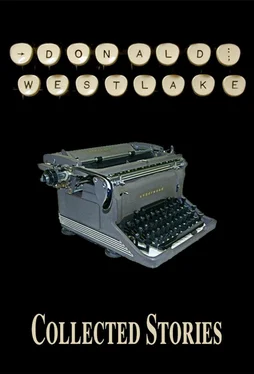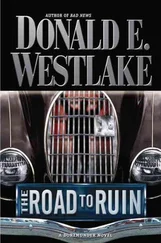Дональд Уэстлейк - Collected Stories
Здесь есть возможность читать онлайн «Дональд Уэстлейк - Collected Stories» весь текст электронной книги совершенно бесплатно (целиком полную версию без сокращений). В некоторых случаях можно слушать аудио, скачать через торрент в формате fb2 и присутствует краткое содержание. Год выпуска: 2020, Издательство: Jerry eBooks, Жанр: Фантастика и фэнтези, Детектив, short_story, на английском языке. Описание произведения, (предисловие) а так же отзывы посетителей доступны на портале библиотеки ЛибКат.
- Название:Collected Stories
- Автор:
- Издательство:Jerry eBooks
- Жанр:
- Год:2020
- ISBN:нет данных
- Рейтинг книги:5 / 5. Голосов: 1
-
Избранное:Добавить в избранное
- Отзывы:
-
Ваша оценка:
- 100
- 1
- 2
- 3
- 4
- 5
Collected Stories: краткое содержание, описание и аннотация
Предлагаем к чтению аннотацию, описание, краткое содержание или предисловие (зависит от того, что написал сам автор книги «Collected Stories»). Если вы не нашли необходимую информацию о книге — напишите в комментариях, мы постараемся отыскать её.
Collected Stories — читать онлайн бесплатно полную книгу (весь текст) целиком
Ниже представлен текст книги, разбитый по страницам. Система сохранения места последней прочитанной страницы, позволяет с удобством читать онлайн бесплатно книгу «Collected Stories», без необходимости каждый раз заново искать на чём Вы остановились. Поставьте закладку, и сможете в любой момент перейти на страницу, на которой закончили чтение.
Интервал:
Закладка:
Frederick got slowly to his feet. Then he stopped. “What if I do what you tell me?” he asked. “Maybe you’ll kill the both of us anyway.”
The youth stiffened. This was the tough part. He knew that might occur to them, that he couldn’t let them live, that they could identify him, and he had to get over it, he had to make them believe a lie. “That’s the chance you got to take,” he said. He remembered his own thoughts, out in front of the house, and he smiled. “It’s what they call a calculated risk. Only I wouldn’t worry. I don’t think I’d kill anybody who did what I told them and who gave me five or six grand.”
“I’m not sure there’s that much there.”
“For your sake,” said the youth softly, “I hope there is.”
Frederick glanced at Louise. She was still staring at the youth, and her hand was still pressed against her mouth. He looked back at the youth again. “I’ll get my coat.”
The youth relaxed. It was done, the guy had gone for it. “You only got till eight o’clock,” he said. “You better hurry.”
“Hurry,” said Frederick. He turned and walked to the hallway closet and put on his coat and hat. He came back, paused to say to his wife, “I’ll be right back,” but the sentence sounded inane, said before the boy with the gun. “I’ll hurry back,” he said, but Louise still stared at the youth, and her arm was still bent and tense as she tightly gripped her mouth.
Frederick moved quickly through the house and out the back door. Automatically, he put on his overshoes, wet and cold against his ankles. He pushed open the screen door and hurried over to the garage. He had trouble opening the overhead door. He scraped between the side of the car and the concrete block wall of the garage, squeezed behind the wheel, backed the car out of the garage. Still automatically, he got out of the car and closed the overhead door again. And then the enormity of it hit him. Inside there was Louise, with a killer. A youth who would murder her, if Frederick didn’t get back in time.
He scurried back to the car, backed out to the street, turned and fled down the dark and silent, snow-covered street.
Hurry. He had to hurry. The windshield misted and he wiped impatiently at it, opened the window a bit and a touch of frost brushed his ear. The car was cold, but soon the heater was working full-strength, pumping warm dry air into the car.
His mind raced on, in a thousand directions at once, far ahead of the car. Way in the back of his mind, the Samoan virgins swayed and danced, motioning to him, beckoning to him. At the front of his mind loomed the face of the youth and the functional terror of the pistol. He would kill Louise, he really would.
He might kill her anyway. He might kill them both. Should he call the police? Should he stop and call the police? What was it the youth had said? Calculated risk. Calculated risk.
He turned right, turned left, skidded as he pressed too hard on the accelerator, barely missed a parked car and hurried on. His heart pounded, now because of the narrow escape from an accident. He could kill himself in the car, without any youths with pistols and sharp bitter faces.
Nonsense. Even at thirty miles an hour, bundled up in an overcoat the way he was, hitting a parked car wouldn’t kill him. It might knock him out, shake him up, but it wouldn’t kill him.
But it would kill Louise, because he wouldn’t get back in time.
Calculated risk. He slowed, thought of a life without Louise. The snow collapsed from the sky, and he thought of Samoa. What if he didn’t go back?
What if he didn’t go back?
But the boy might not kill her after all. And he would return, tomorrow or the next day, and she would be waiting for him, and she would know why he hadn’t come back. She would know that he had hoped the boy would kill her.
But what if he couldn’t go back?
Calculated risk. With sudden decision he accelerated, tearing down the empty residential street. He jammed his foot on the brakes, the tires slid on ice, he twisted the wheel, and the car hurtled into a telephone pole. The car crumpled against the pole with a squealing, jarring crash, but Frederick was lulled to unconsciousness by the sweet, sweet songs of the islands.
Travelers Far and Wee
A Fable of Futurity
Roger turned right on Eighth Avenue from Fourteenth Street and drove uptown. Phil was asleep in the seat on his right. Roger readjusted himself behind the wheel, cut between two cabs, barely missed a truck, gradually worked the car — this year’s Oldsmobile, with the latest sanitary equipment — over to the left-hand side of the road. Eighth Avenue is one way, uptown, and Roger drove along the farthest lane over to the left. The lights were staggered, and Roger pushed the car at just under thirty miles an hour, clicking across each intersection just as the light snapped green.
He turned left on Forty Fifth Street, crossed Ninth Avenue, followed Forty Fifth Street down to the end, turned right and drove up the ramp to the Parkway. He speeded up to thirty five miles an hour, and glanced over at Phil. The poor guy was still asleep.
At One Hundred Seventy Fifth Street, Roger turned off and took the approach to the George Washington bridge. He drove across the bridge, rolled the window down, dropped a fifty cent piece into the toll taker’s hand. Rolling the window back up, he pulled out among the Jersey traffic.
Roger appeared to be about forty. Since it was a chill October day, he wore a tailored herringbone tweed topcoat, a gray hat and tan gloves. His face was full-fleshed, but not puffy. He didn’t wear glasses, and he looked like a successful businessman.
Phil, asleep on the seat beside him, wore approximately the same clothing. Although his face had its own individuality, it gave the same impression as did Roger’s. A man of means, an executive, a man who gives commands, a man of business and foresight and a good income.
Roger swooped the gray Olds halfway round a cloverleaf, swung gently and smoothly into a turn-off, barely touched the power brakes, and the car purringly decelerated as he drove into the tiny Jersey town.
The bank was on the main road of town. Roger turned into the driveway and parked behind the car waiting by the drive-in teller’s window. He took out checkbook and pen, wrote out a check to cash, and when his turn came, drove up to the window, rolled down the window at his side, and handed the check in to the teller. After a minute, the teller pushed a wad of greenbacks out to him. Roger took the money, tossed it carelessly on the seat between himself and Philip, rolled up the window, and drove around the modest brick bank building, out to the street, and turned back the way he had come.
Another fifty cents to the man at the tollgate, and Roger drove the car swiftly back across the bridge. This time, he took the “Local Streets” exit, turned north, drove until he came to the drive-in restaurant. He parked before the neon-coated, modernistic, glassed-in building, and waited until the chilly girl carhop came over to take his order. He asked for a hamburger, a cup of coffee, apple pie with ice cream. The carhop went away, and Roger picked up the cash that had been lying on the seat, counted it, shoved it into the glove compartment with the rest of the money there, except for one ten dollar bill, and put that bill on top of the dashboard.
He ate his meal, handed the ten dollars to the carhop, and said, “Keep the change.” He knew when he said it that it was a stupid thing to do, but he didn’t really care. He backed out to the highway, leaving the carhop stunned behind him, and headed back toward the city.
He glanced at his watch. Almost four thirty. He had to get downtown soon. He drove down Ninth Avenue, keeping to the left, turned onto Fourteenth Street, over to Lexington, turned uptown again, cutting off a cab that was coming the other way on Fourteenth Street, and held traffic up for quite a while during which he executed some complicated maneuvering, making a left turn into Seventeenth Street.
Читать дальшеИнтервал:
Закладка:
Похожие книги на «Collected Stories»
Представляем Вашему вниманию похожие книги на «Collected Stories» списком для выбора. Мы отобрали схожую по названию и смыслу литературу в надежде предоставить читателям больше вариантов отыскать новые, интересные, ещё непрочитанные произведения.
Обсуждение, отзывы о книге «Collected Stories» и просто собственные мнения читателей. Оставьте ваши комментарии, напишите, что Вы думаете о произведении, его смысле или главных героях. Укажите что конкретно понравилось, а что нет, и почему Вы так считаете.








